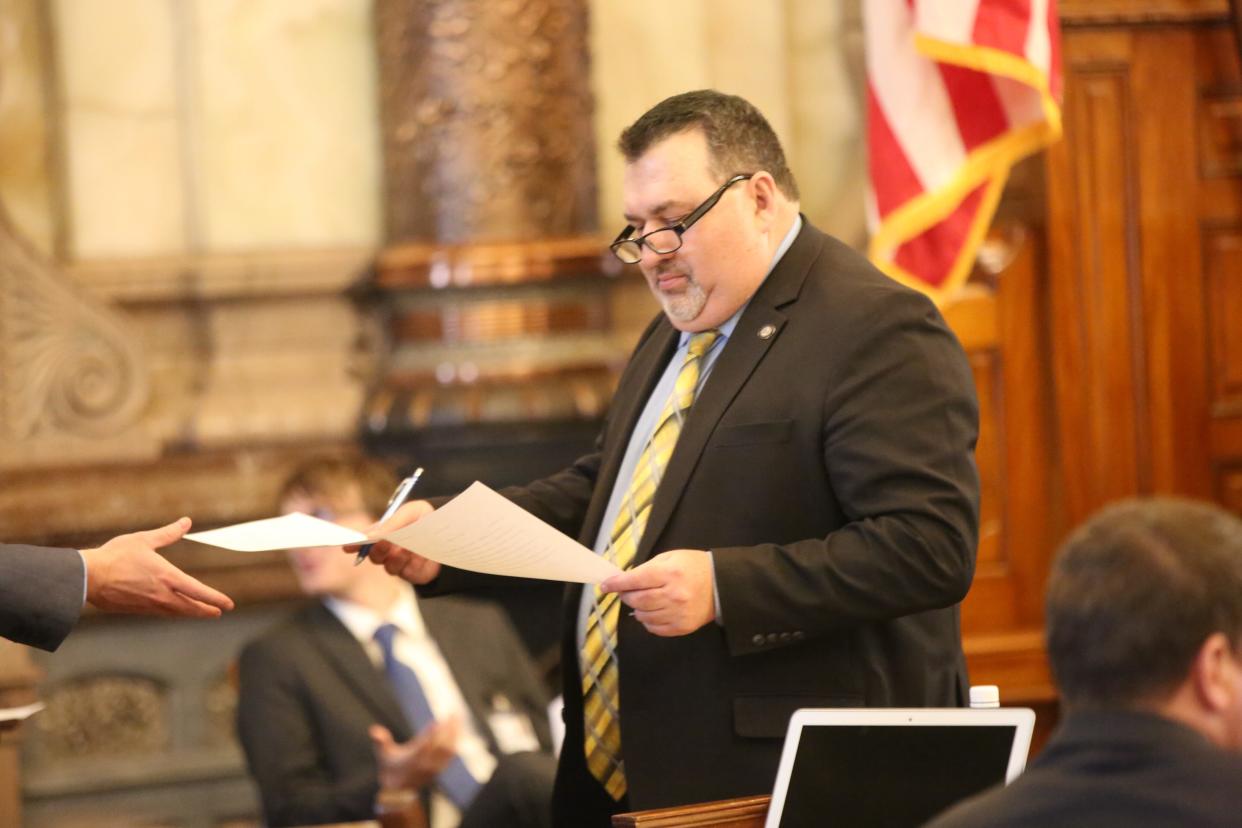After defeating Kansas flat tax bill, flip-flopping GOP senator loses leadership position

- Oops!Something went wrong.Please try again later.
- Oops!Something went wrong.Please try again later.
After a failed attempt to revive a flat tax bill, the Republican senator who flipped and torpedoed the tax package has lost a committee leadership in an apparent act of retribution.
With politicians facing the prospects of leaving Topeka for the year without passing any tax relief amid burgeoning budget surplus, Senate Republicans briefly revived the controversial flat income tax package.
But Sen. Rob Olson, R-Olathe, flipped from his past yes vote, saying the bill primarily benefited wealthier Kansans.
"He's cheaply transactional, that's what I make of it," Senate President Ty Masterson, R-Andover, told reporters afterward.
About 20 minutes later, Masterson sent a news release announcing Olson had been removed as chair of the Senate Utilities Committee.
"His services are no longer required," Masterson said.
"I'm sure the president's upset because of my vote on the tax bill," Olson told The Capital Journal afterward, defending his vote as standing up for lower-income Kansans hurting from inflation and his constituents.
"I just don't believe they sent me there to hand out tax cuts to the very top of the bracket while not doing anything for everybody else. He's the president. He gets to control the Senate and the agenda and all that, but he doesn't get to control my vote."
Senate Bill 169 contains a bundle of mostly bipartisan income, sales and property tax cuts, but its most substantive piece was a Republican-backed flat tax that would have imposed a 5.15% single rate, eliminating the current three-bracket progressive structure.
Gov. Laura Kelly vetoed the bill Monday. She told reporters Thursday that she doesn't see it as her fault that no tax relief will happen this year, blaming Republicans for not advancing her proposals without a flat tax attached.
"I'm not going to take any blame for the lack of tax cuts this year because I offered several very reasonable options for them," Kelly said. "And they still have time, they're not gone yet. If they wanted to do something, they could do it."
Republican leadership have said they won't consider any further tax cuts this session.
When the Senate attempted to override the veto on Wednesday, it fell one vote short. Sen. Carolyn McGinn, R-Sedgwick, who voted against it, had a change of heart by Thursday evening and used a procedural move to force a do-over.
She explained that "I had not done my due diligence" in looking at budget projections, and had since concluded the tax cut was affordable considering healthy budget surpluses and the rainy day fund.
"At what point in time do we keep our piggy bank growing higher and higher and our ending balances grow higher and higher without trying to put forth some kind of a plan that gives this money back to the people of Kansas and in a responsible way?" McGinn said.
But Olson said he now wished he didn't vote for the bill.
"The individual bracket we've got is poorly laid out," he said. "I would like to know better where that money's going. And the only thing I can figure out by doing my math and running the tax calculations, people that are making more than $100,000 are doing really well in this tax bill. I struggle with that."
Sen. Caryn Tyson, R-Parker and the tax committee chair, disputed that.
"This bill is about the average, low-income taxpayer," Tyson said. "And if you don't see that, you're in denial."
Kansas Department of Revenue estimates show the flat tax would have cut taxes by about $318 million in its first year, with 38% of the benefit going to the top 2% of income earners.
The top 2% — with incomes above $250,000 — would see an average tax cut would be $3,084 a year. The poorest would see nearly all of their tax burden eliminated. Meanwhile, middle class Kansans would see about $8 in savings per month.
While the flat tax was hotly contested, the tax package did contain a collection of other tax cuts touted for benefiting poor and middle class people, but GOP leadership did not allow those provisions to be split from the flat tax.
"I think he has a different district to account to and different people to account to that I don't have to," Olson said of Masterson. "When you run a Senate where you try and force people to vote for stuff they don't want, I think it is not a very good Senate model to run off of. I think people have got to represent their districts."
It is not the first time Masterson has hit back against rebellious members of his own caucus.
Last year, after Sens. Mark Steffen, Alicia Straub and Dennis Pyle attempted to sink a vote to override Kelly’s veto of a set of controversial Congressional maps, Masterson removed them from some of their committee assignments.
Olson has long had a frosty relationship with leadership. In 2021, he also sunk a high-profile school choice bill, flipping his vote to kill the measure at the last minute. While the move earned him a stern rebuke from Masterson, it did not result in any changes to committee leadership.
This article originally appeared on Topeka Capital-Journal: Kansas flat income tax cut fails again in second veto override attempt

